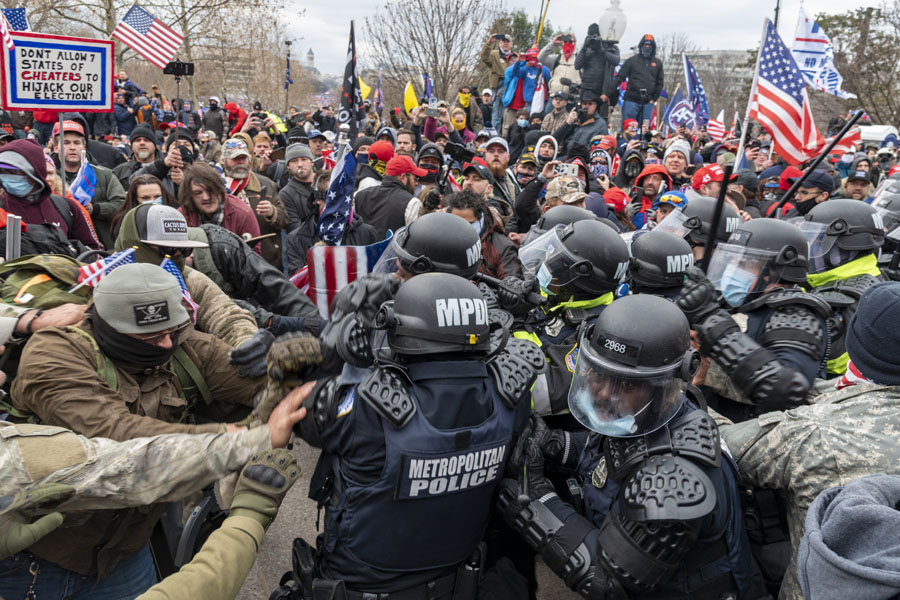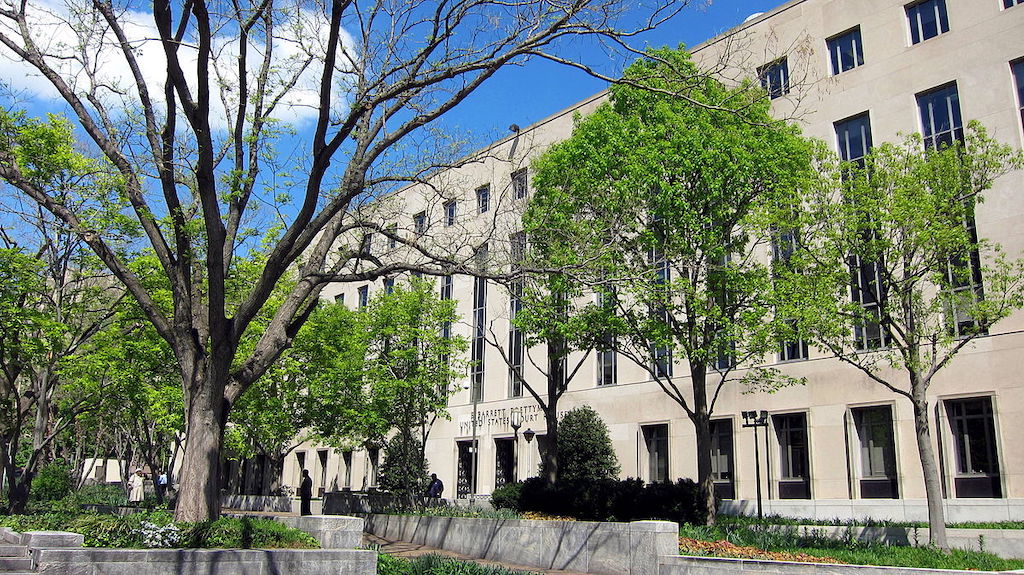Government Wins Key Ruling on Issue Affecting Hundreds of Capitol Riot Cases
On Dec. 10, U.S. District Judge Dabney Friedrich found that a central felony charge in a large subset of the Jan. 6 cases had been properly invoked and was not unconstitutionally vague. This is likely a very big win for the government.

Published by The Lawfare Institute
in Cooperation With

On Friday, Dec. 10, the government won a key early ruling concerning a legal issue affecting hundreds of Jan. 6 Capitol Riot prosecutions.
U.S. District Judge Dabney Friedrich found that a central felony charge in a large subset of the Jan. 6 cases—“corruptly obstructing an official proceeding” —had been properly invoked and was not unconstitutionally vague. The provision has been lodged against about 270 of the more than 690 Capitol Riot defendants accused so far in federal court (about 40 percent of all cases). In many prosecutions, it is the only felony charged. Jacob Chansley, for instance—the so-called QAnon Shaman—pleaded guilty to a single charge of corruptly impeding an official proceeding. He is now appealing his 41-month sentence.
Prosecutors appear to have turned to the obstruction of an official proceeding law—which carries a 20-year maximum prison term—in lieu of invoking the more politically incendiary, rarely tested and challenging-to-prove charges of insurrection, under 18 U.S.C. §2383, or seditious conspiracy, under 18 U.S.C. §2384. As I previously explained, if the attack was an “insurrection,” then the argument might be made that certain past or current federal or state legislators, military veterans or conceivably former President Trump himself could now be excluded from holding public office under the opaque, long-dormant terms of Section 3 of the 14th Amendment. The seditious conspiracy law, for its part, carries unsavory historical connotations, having sometimes been used against advocates of politically unpopular causes in situations that raised First Amendment issues.
But numerous defendants have protested that this statute—which was originally enacted as part of the Sarbanes-Oxley Act of 2002—is inapplicable to the Jan. 6 insurrection. Sarbanes-Oxley was passed in the wake of the collapse of Enron, whose auditor had destroyed potentially incriminating financial documents that could have been used against the company in criminal proceedings. The defendants argue that this legislative history, together with the law’s structure, show that it was designed to punish obstructions only of official proceedings involving “the administration of justice”—that is, hearings involving “witness testimony” or “evidence.” The title of the section of the U.S. Code containing these provisions—“Tampering with a witness, victim or informant”—supports that view, the defendants argue. A joint session of Congress to certify the Electoral College vote was not the sort of “official proceeding” Congress had in mind, they contend.
The defendants also argue that the statute’s use of the word “corruptly” is unconstitutionally vague, violating the defendants’ Due Process rights. At least two federal judges—Judges Randolph Moss and Amit Mehta—have expressed concerns about the way prosecutors are using the law in the Capitol riot cases, though they have not yet ruled on pending challenges to §1512(c)(2) charges in cases before them. In August, for instance, Judge Moss asked prosecutors pointed questions about what “limiting principle” determined when they were invoking this grave felony as opposed to one of the far lighter misdemeanors that most defendants were being charged with (typically, “entering or remaining” in a “restricted” federal building or grounds, 18 U.S.C. §1752(a)(1) and (a)(2), or “parading, demonstrating or picketing” in the Capitol building, 40 U.S.C. §5104(e)(2)(G)).
It is true, in fact, that the government sometimes seems to be choosing between whether to charge a felony or misdemeanor based largely upon how far into the Capitol building a given rioter penetrated. Nonviolent rioters who only reached the Capitol Rotunda, for instance, have typically been charged with misdemeanors. Those who penetrated the Senate chamber, on the other hand, or into Speaker Nancy Pelosi’s or Sen. Jeff Merkley’s offices have often been charged with felonies.
Judge Friedrich’s ruling does not, of course, end the dispute. At least one of these cases will be appealed, and the issue seems destined to land before the U.S. Supreme Court. Friedrich’s ruling also won’t be binding on her fellow district judges, who will issue their own rulings.
The specific cases before Judge Friedrich involved extremely serious allegations. Defendants Ronald Sandlin and Nathaniel DeGrave were each charged with multiple felonies for, among other things, conspiracy and assaulting six police officers.
On Dec. 23, 2020, Sandlin, a Tennessee man, wrote on Facebook that he was going to Washington, D.C. on Jan. 6 in order “to stop the steal and stand behind Trump when he decides to cross the Rubicon,” according to the indictment.
In a private conversation on Facebook, he asked DeGrave if he’d join him. “Are you down for danger bro?” Sandlin asked.
DeGrave said he was, writing: “Im bringing bullet proof clothing.”
In the car they brought “paramilitary gear, one Glock .43 pistol, an M&P bodyguard pocket pistol, two magazines of ammunition, knives, a handheld taser/stun gun, an expandable baton, walkie talkies, and bear mace,” Friedrich notes in her ruling, quoting the indictment.
“[S]hortly before the Capitol attack,” she continues (tracking the indictment), “the defendants recorded a livestream video in which Sandlin said that ‘freedom is paid for with blood’ and ‘there is going to be violence.’”
Friedrich then recapitulates a few highlights of the indictment (citations to the indictment omitted):
Just after 2:00 p.m., the defendants “forcibly stormed past exterior barricades and law enforcement officers, and ignored building alarms, to breach the Capitol.” They pushed several Capitol police officers guarding an exterior door to the Capitol rotunda, thus allowing the mob outside to breach the building. Sandlin attempted to rip the helmet off one of the officers. They made their way to the Senate Gallery, where they wrestled officers in order to get inside; Sandlin struck one of the officers in the back of his head. In the Senate Chamber, DeGrave shouted at the rioters to “take laptops, paperwork, take everything.”
Given these shocking allegations, the case certainly presented the controversies surrounding the “obstructing an official proceeding” charge in a context that was maximally favorable for the government. Indeed, Friedrich’s ruling may still leave some wiggle-room for defendants whose alleged conduct was not as violent or planned as that of Sandlin’s or DeGrave’s. For while Friedrich found that the accusations against Sandlin and DeGrave came within the “core” conduct that the law was designed to prevent, she acknowledged that “there may be [other] scenarios at the edges that present vagueness problems.”
That said, Friedrich’s succinct 26-page ruling does provide the government with a strong win and a well-reasoned precedent to show other judges. It employs a textualist, plain-meaning analysis that appears well crafted to appeal to conservative jurists, including the majority of the Supreme Court as currently composed. Friedrich was appointed to the U.S. District Court for the District of Columbiaby President Trump and previously served as an associate counsel to President George W. Bush.
As for the statutory question, Judge Friedrich had little problem finding that §1512(c)(2) applied to the facts at hand. While it was true that Sarbanes-Oxley was spurred by very different events, “statutes often reach beyond the principal evil that animated them,” she wrote.
She found no textual basis for interpreting the phrase “official proceeding” to reach only hearings involving the taking of testimony or evidence. On the contrary, the law explicitly defines “official proceeding” to include “a proceeding before Congress” (at 18 U.S.C. 1515(a)(1)(B)), while its other terms, she wrote, are “expansive and seemingly encompass all sorts of actions that affect or interfere with official proceedings.” The fact that the §1512’s title in the U.S. Code was somewhat inapt merely reflected that §1512(c) had been inserted into a “preexisting provision.” Its earlier title had simply never been adjusted “to reflect the new subsection’s focus.”
Although she agreed with the defendants that the “proceeding” in question “must be akin to a formal hearing,” the constitutionally and statutorily mandated joint session before Congress to certify the Electoral College votes met that hurdle.
“There is a presiding officer,” she wrote, “a process by which objections can be heard, debated, and ruled upon, and a decision—the certification of the results—that must be reached before the session can be adjourned.”
The Due Process challenge—asserting that the term “corruptly” was unconstitutionally vague—was also unavailing, she found, at least for defendants Sandlin and DeGrave.
The chief hurdle here was a 1991 ruling of the U.S. Court of Appeals for the D.C. Circuit stemming from the Iran/Contra Affair. There, a split panel had overturned two convictions of former National Security Adviser John Poindexter under a different statute, 18 U.S.C. §1505, for having “corruptly” obstructed Congress by lying to it. But Judge Friedrich found that subsequent courts had “cabined Poindexter’s holding to its facts and had not read it ‘as a broad indictment of the use of the word ‘corruptly’ in the various obstruction-of-justice statutes.” (Congress has since amended that particular statute in an attempt to overrule Poindexter.)
“The touchstone” of a vagueness, Friedrich wrote, citing well-established precedents, is whether the statute “made it reasonably clear at the relevant time that the defendant’s conduct was criminal.”
Reviewing other courts’ interpretations of the meaning of “corruptly,” she found that the word had generally been construed to mean “wrongfully,” “intentionally,” or using means that were “independently criminal” or “inherently malign.”
Accepting those definitions, the case before her was a fairly easy one. “The indictment in this case alleges obstructive acts that fall on the obviously unlawful side of the line,” she wrote. “Defendants engaged in advance planning, forcibly breached the Capitol building, assaulted Capitol police officers, and encouraged others to steal laptops and paperwork from the Senate Chamber.”
It’s true that this ruling does leave open at least the theoretical possibility that another case—without sufficient allegations of intentional and wrongful obstruction—might fall on the other “side of the line.” On the other hand, it’s hard to imagine that prosecutors would have charged a Capitol riot defendant with this felony without being able to meet that hurdle.
This means that this well-reasoned, textualist ruling from a Trump-appointed judge looks like a very big win for the government.



